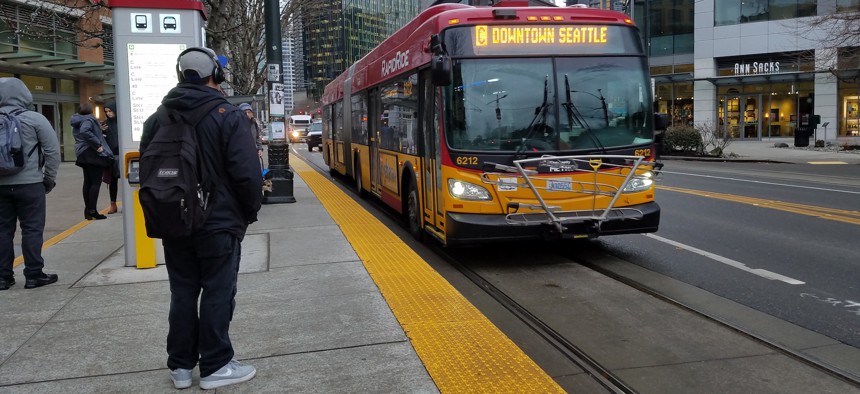Connecting state and local government leaders
Local jurisdictions are looking at less-expensive ways to improve transit service through traffic-clogged corridors. But it takes advocates inside and outside government to make them a reality.
CAMBRIDGE, Mass. — This past week, local officials here announced that the city had received a grant from the Boston-based Barr Foundation to launch a pilot project at two intersections aimed at speeding up bus service with “queue jump” lanes where a special traffic signal gives transit vehicles a green light before regular traffic can proceed.
While those queue jumps aren’t a new innovation, they’re something not widely used in U.S. cities. But they can help buses navigate traffic choke points, keep them on schedule and cut travel times for riders. When paired with dedicated transit lanes on surface streets and other infrastructure, like off-board fare payment, queue jumps can help transform ordinary bus service into bus rapid transit.
As funding for investments in heavy-rail and light-rail expansion remains scarce, many local jurisdictions are looking at less-expensive ways to improve transit service through congested corridors.
Albuquerque, for instance, is in the process of rolling out the nation’s first gold standard bus rapid transit line, with dedicated lanes for most of the route along the Central Avenue corridor.
In Seattle—where I live—local transportation officials have worked with King County Metro to carve out bus-only lanes and “business access and transit lanes” along key corridors like Aurora Avenue, which now hosts the area’s most-used bus line, the Rapid Ride E. During peak commuting times, buses on Aurora breeze by single-occupancy vehicles sluggishly moving through the congestion. Elsewhere in the city, like along the heavily-used crosstown 44 bus line, queue jump signals help King County Metro buses move through a few choke points along the way. Investments in bus-priority infrastructure have helped boost bus ridership in Seattle as it has fallen in other cities.
Transit officials in the Boston area are hoping to improve mobility through investments in bus-priority infrastructure, just like those that have improved mobility in Seattle in recent years.
“These pilot projects will show BRT’s potential to transform how people in Greater Boston get to where they need to go, and how BRT can fit within the region’s transportation system,” Mary Skelton Roberts, co-director for climate at the Barr Foundation, said in a statement. “For BRT to be successful, local and state governments, communities, and transit experts need to work together. These winning proposals demonstrated their readiness to do so.”
In September, officials in the city of Everett, about four miles north of downtown Boston, decided to create a permanent bus lane along a major thoroughfare after a multi-month experiment where a parking lane was marked off with cones during the morning rush hour and reserved for transit.
“Since we have installed our bus lane, trips are now shorter by four to eight minutes for Broadway’s 10,000 daily bus riders and we have also saved car drivers time, because buses no longer block traffic,” Mayor Carlo DeMaria said at the time, according to the Everett Independent. Three bus-priority traffic signals are planned, too.
More bus lanes are envisioned in the Boston area. “If you ever wanted an advertisement to get people out of their single-occupancy vehicle, it’s having a bus beside them going three times the speed they are,” MBTA board member Monica Tibbits-Nutt told The Boston Globe in November. “And I think our bus users deserve it. The amount of people who have decided to live without a car, or to leave a car at home, that’s huge. And they have been ignored.”
That’s been the case in the Washington, D.C. area, where despite a robust bus network with many routes featuring frequent service, 600,000 bus commuters sit in the same congested traffic that single-occupancy vehicles deal with on a daily basis. Aside from a single one-third-of-a-mile-long bus lane along Georgia Avenue, the District of Columbia lacks bus-priority infrastructure to speed transit users through congested corridors. A major disruption during rush hour, like an early-evening political fundraiser at the St. Regis Hotel near the White House, can paralyze bus service across the city.
The greater D.C. region “is far behind other major metropolitan areas when it comes to giving buses priority over motorists who drive by themselves,” WAMU News transportation reporter Martin DiCaro recently said.
One particular sore spot for D.C. bus advocates has been 16th Street NW, a heavily trafficked corridor where bus lanes have been studied for years. If there’s a thoroughfare where the case for bus lanes is clear, it’s 16th Street. During rush hour, half of the people traveling along 16th Street are doing so on buses, which are crowded and delayed. Transit advocates have been frustrated that D.C. transportation officials have moved so slowly.
A portion of Metrorail’s Red Line has been closed since Nov. 25 for major maintenance work, with shuttle buses replacing trains between the impacted stations. As DiCaro noted, those shuttle buses took, at times, 48 minutes to travel the four-mile route during the morning rush. It was, some observers said, a “missed opportunity” to demonstrate the effectiveness of bus lanes, not just along the shuttle bus route, but also on 16th Street, which bypasses the Red Line work zone.
What’s a major difference between Washington, D.C. and cities that have successfully implemented bus lanes? Political leadership and vocal champions advocating for bus-priority infrastructure.
Unlike Mayor DeMaria in Everett or the Barr Foundation in the Boston area funding pilot projects for queue jump lanes, there are few champions for buses in the nation’s capital. Until there are, D.C. commuters will stew in the congestion as other metropolitan areas eclipse the nation's capital in making mobility improvements.
Michael Grass is Executive Editor of Government Executive’s Route Fifty and is based in Seattle.

NEXT STORY: Cutting continuous monitoring down to size




